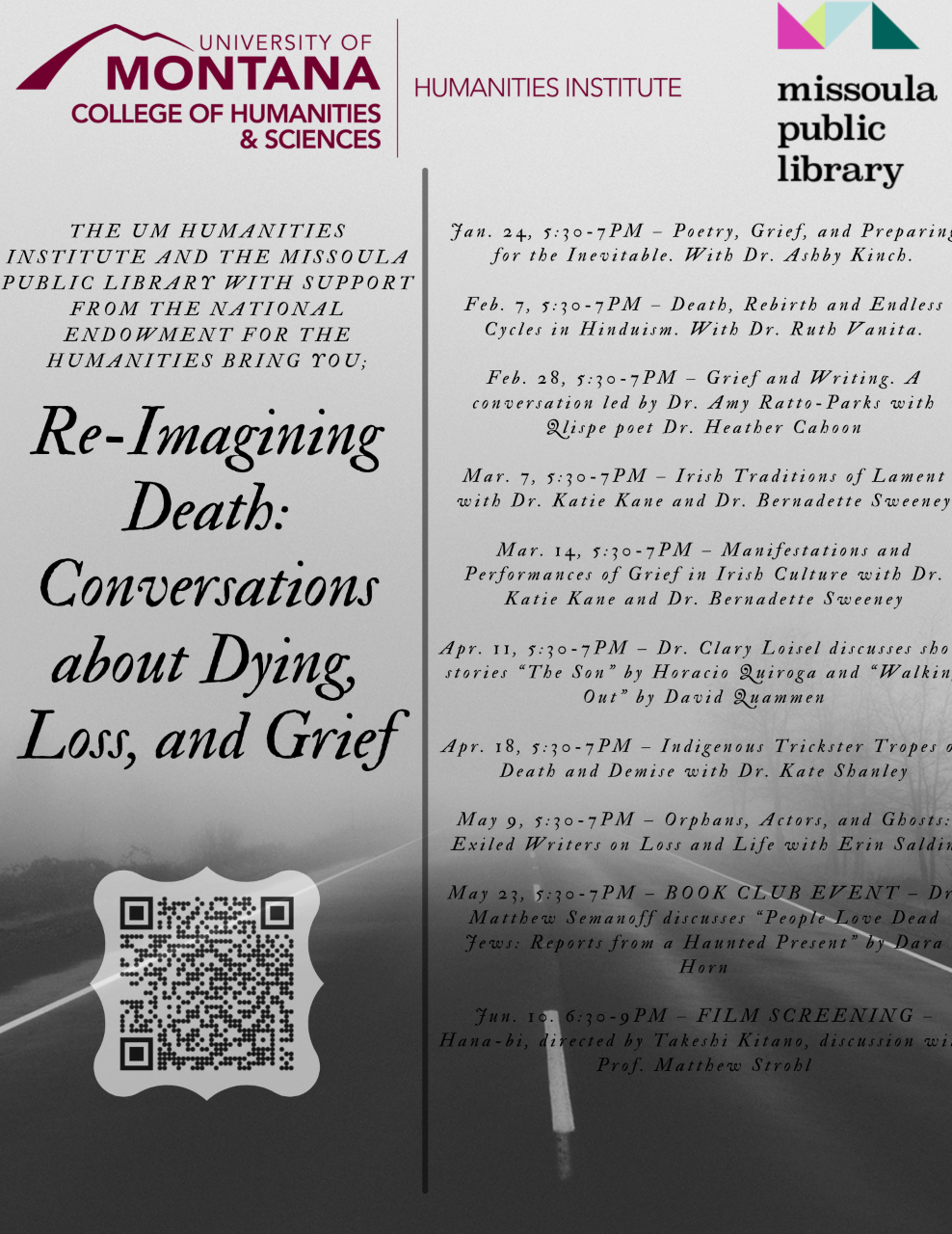UM Humanities Address Death, Dying and Grief in New Series
MISSOULA – Ashby Kinch, a University of Montana professor of English, has spent his career studying the 14th and 15th centuries. Despite broad social advances, there’s still something citizens of the Middle Ages did better than we do now: talk about and process death, dying and grief.
“During the Black Plague, communities had an intense cultural experience of observing death at close hand,” Kinch said. “But in the face of so much death and loss, we don’t see despair; we see a lot of positive and affirmative writing about why life is important, why communities are important. The works from those experiences provided a richly articulated death culture and practices prior to modernization.”

Kinch said that despite being surrounded by death, famine and warfare, many in the Middle Ages turned loss into works of beauty – either through literature, painting or poetry that guided people through the experience. As the world enters its third year in the COVID-19 pandemic, with global deaths estimated near 5 million and over 850,000 deaths in the U.S., there is much we can learn from our ancestors, Kinch said. Death he adds, should be seen beyond a legal or medical context.
“Our cultures and our values about death and how we behave around loss are mismatched,” Kinch said. “We need richer, longer, sustained conversations about how we prepare for death.”
Creating space for conversations on themes of dying, loss and grief is the subject of a new free lecture series from UM’s Humanities Institute titled “Re-Imagining Death, Dying and Grief.” The short lectures at the Missoula Public Library are designed to generate discussion and reflection on the diverse ways global cultures have addressed death and grief.
UM faculty members will share their expertise across a range of disciplines in poetry, literature, Irish culture, short stories and Indigenous studies. The lectures will address everything from death rituals and beliefs in Hinduism to Irish lamentations on loss, death experiences of past time periods, shifting attitudes about death in cultural practices and death practices like funerals, cremation and end-of-life experiences.
The lecture series is sponsored by a half-a-million dollar grant from the National Endowment of the Humanities for public programming in the humanities that “are an essential component of economic and civic life in the United States.” In October, UM was awarded the maximum level of grant funding for one year to support events, classes and scholarship in history, literature, anthropology and Native American Studies in UM’s College of Humanities and Sciences.
“The more we’ve advanced as a society, in many ways, the further we’ve moved away from how to deal as a community with death and loss,” Kinch said. “We have these disoriented, repressed conversations about loss and what it means to be a good friend or even a good citizen in times of death.” Kinch hopes the lecture series provides a “richer, broader discussion about loss” through conversation led by humanists who present an array of ideas to explore the journey of death, including history, philosophy and an exploration of world cultures.
Sarah Velk, programming librarian at the Missoula Public Library, said the first lecture in the series, presented by Kinch, drew 37 attendees.
“We value this series, not only because it’s my perception that our community is ready to discuss and engage with a difficult topic, but also because the library’s mission includes providing programs that have cultural and educational relevance to the community.”
That’s where the role of humanities in the public space comes in, said Gillian Glaes, director of UM’s Humanities Institute.
“This lecture series helps us to process the grief, anxiety and sadness that we’ve experienced over the past few years in the midst of the pandemic while reminding us that many societies have, historically, dealt with egregious losses,” Glaes said. “We can learn so much from their experiences while confronting our own. And that ability to provide perspective is one of the most powerful contributions made by the humanities.”
“Humans crave meaning, and the humanities are meaning-making machines,” Kinch said. “They allow us to generate ideas, feelings and sensations to explore this field of death together.”
The lectures are free and open to the public and located in the Cooper Room on the fourth floor of the Missoula Public Library. The schedule of events is:
- Monday, Feb. 7, 5:30 p.m. “Death, Rebirth and Endless Cycles in Hinduism” presented by Dr. Ruth Vanita.
- Monday, Feb. 28, 5:30 p.m. “Grief and Writing” presented by Dr. Amy Ratto-Parks and Dr. Heather Cahoon.
- Monday, March 7, 5:30 p.m. “Irish Traditions of Lament” presented by Dr. Katie Kane and Dr. Bernadette Sweeney.
- Monday, March 14, 5:30 p.m. “Manifestations and Performance of Grief in Irish Culture” presented by Dr. Katie Kane and Dr. Bernadette Sweeney.
- Monday, April 18, 5:30 p.m. “Indigenous Trickster Tropes on Death and Demise” presented by Dr. Kate Shanley.
- Monday, May 9, 5:30 p.m. “Orphans, Actors and Ghosts: Exiled Writers on Loss and Life” presented by Dr. Erin Saldin.
For a full list of public humanities programming visit hs.umt.edu/hi and the Missoula Public Library. Masks are required at the lectures.
Contact: Ashby Kinch, interim dean, UM Graduate School, professor of English, 406-243-6695, ashby.kinch@mso.umt.edu; Gillian Glaes, director, UM Humanities Institute, 406-546-8966, gillian. glaes@umt.edu.